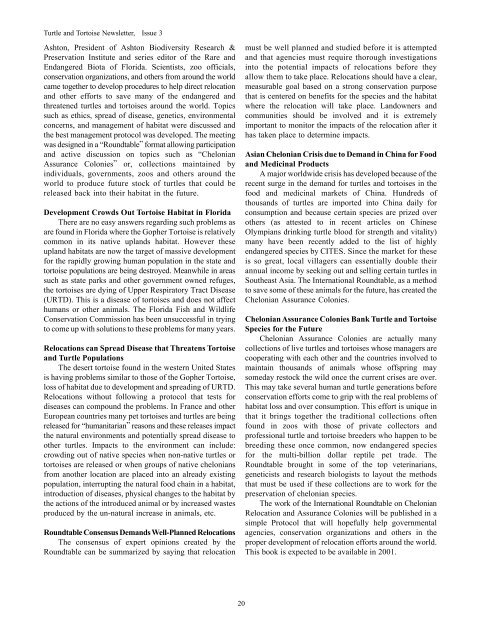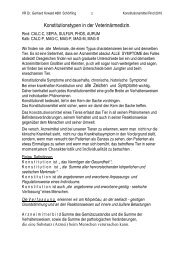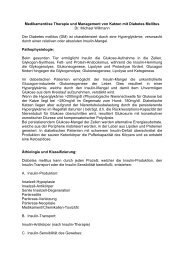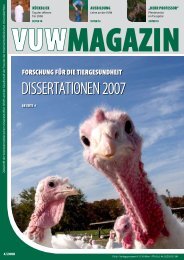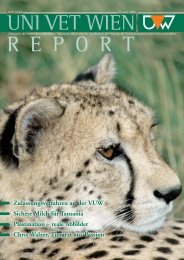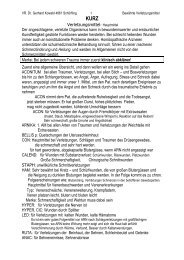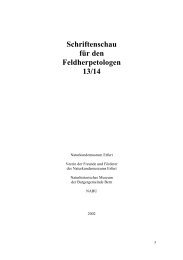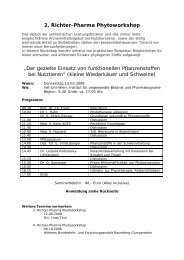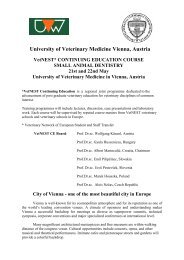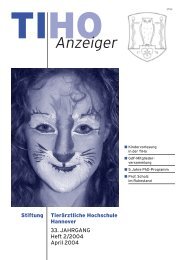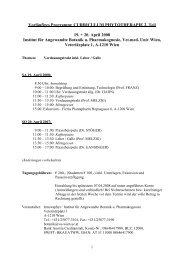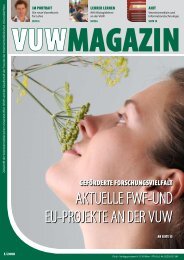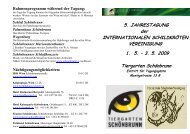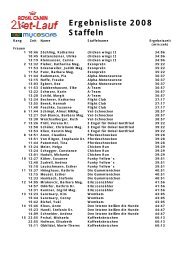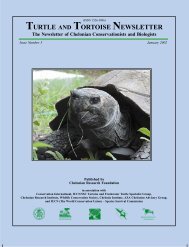Turtle and Tortoise Newsletter - VET-MAGAZIN.com
Turtle and Tortoise Newsletter - VET-MAGAZIN.com
Turtle and Tortoise Newsletter - VET-MAGAZIN.com
You also want an ePaper? Increase the reach of your titles
YUMPU automatically turns print PDFs into web optimized ePapers that Google loves.
<strong>Turtle</strong> <strong>and</strong> <strong>Tortoise</strong> <strong>Newsletter</strong>, Issue 3Ashton, President of Ashton Biodiversity Research &Preservation Institute <strong>and</strong> series editor of the Rare <strong>and</strong>Endangered Biota of Florida. Scientists, zoo officials,conservation organizations, <strong>and</strong> others from around the worldcame together to develop procedures to help direct relocation<strong>and</strong> other efforts to save many of the endangered <strong>and</strong>threatened turtles <strong>and</strong> tortoises around the world. Topicssuch as ethics, spread of disease, genetics, environmentalconcerns, <strong>and</strong> management of habitat were discussed <strong>and</strong>the best management protocol was developed. The meetingwas designed in a “Roundtable” format allowing participation<strong>and</strong> active discussion on topics such as “ChelonianAssurance Colonies” or, collections maintained byindividuals, governments, zoos <strong>and</strong> others around theworld to produce future stock of turtles that could bereleased back into their habitat in the future.Development Crowds Out <strong>Tortoise</strong> Habitat in FloridaThere are no easy answers regarding such problems asare found in Florida where the Gopher <strong>Tortoise</strong> is relatively<strong>com</strong>mon in its native upl<strong>and</strong>s habitat. However theseupl<strong>and</strong> habitats are now the target of massive developmentfor the rapidly growing human population in the state <strong>and</strong>tortoise populations are being destroyed. Meanwhile in areassuch as state parks <strong>and</strong> other government owned refuges,the tortoises are dying of Upper Respiratory Tract Disease(URTD). This is a disease of tortoises <strong>and</strong> does not affecthumans or other animals. The Florida Fish <strong>and</strong> WildlifeConservation Commission has been unsuccessful in tryingto <strong>com</strong>e up with solutions to these problems for many years.Relocations can Spread Disease that Threatens <strong>Tortoise</strong><strong>and</strong> <strong>Turtle</strong> PopulationsThe desert tortoise found in the western United Statesis having problems similar to those of the Gopher <strong>Tortoise</strong>,loss of habitat due to development <strong>and</strong> spreading of URTD.Relocations without following a protocol that tests fordiseases can <strong>com</strong>pound the problems. In France <strong>and</strong> otherEuropean countries many pet tortoises <strong>and</strong> turtles are beingreleased for “humanitarian” reasons <strong>and</strong> these releases impactthe natural environments <strong>and</strong> potentially spread disease toother turtles. Impacts to the environment can include:crowding out of native species when non-native turtles ortortoises are released or when groups of native cheloniansfrom another location are placed into an already existingpopulation, interrupting the natural food chain in a habitat,introduction of diseases, physical changes to the habitat bythe actions of the introduced animal or by increased wastesproduced by the un-natural increase in animals, etc.Roundtable Consensus Dem<strong>and</strong>s Well-Planned RelocationsThe consensus of expert opinions created by theRoundtable can be summarized by saying that relocationmust be well planned <strong>and</strong> studied before it is attempted<strong>and</strong> that agencies must require thorough investigationsinto the potential impacts of relocations before theyallow them to take place. Relocations should have a clear,measurable goal based on a strong conservation purposethat is centered on benefits for the species <strong>and</strong> the habitatwhere the relocation will take place. L<strong>and</strong>owners <strong>and</strong><strong>com</strong>munities should be involved <strong>and</strong> it is extremelyimportant to monitor the impacts of the relocation after ithas taken place to determine impacts.Asian Chelonian Crisis due to Dem<strong>and</strong> in China for Food<strong>and</strong> Medicinal ProductsA major worldwide crisis has developed because of therecent surge in the dem<strong>and</strong> for turtles <strong>and</strong> tortoises in thefood <strong>and</strong> medicinal markets of China. Hundreds ofthous<strong>and</strong>s of turtles are imported into China daily forconsumption <strong>and</strong> because certain species are prized overothers (as attested to in recent articles on ChineseOlympians drinking turtle blood for strength <strong>and</strong> vitality)many have been recently added to the list of highlyendangered species by CITES. Since the market for theseis so great, local villagers can essentially double theirannual in<strong>com</strong>e by seeking out <strong>and</strong> selling certain turtles inSoutheast Asia. The International Roundtable, as a methodto save some of these animals for the future, has created theChelonian Assurance Colonies.Chelonian Assurance Colonies Bank <strong>Turtle</strong> <strong>and</strong> <strong>Tortoise</strong>Species for the FutureChelonian Assurance Colonies are actually manycollections of live turtles <strong>and</strong> tortoises whose managers arecooperating with each other <strong>and</strong> the countries involved tomaintain thous<strong>and</strong>s of animals whose offspring maysomeday restock the wild once the current crises are over.This may take several human <strong>and</strong> turtle generations beforeconservation efforts <strong>com</strong>e to grip with the real problems ofhabitat loss <strong>and</strong> over consumption. This effort is unique inthat it brings together the traditional collections oftenfound in zoos with those of private collectors <strong>and</strong>professional turtle <strong>and</strong> tortoise breeders who happen to bebreeding these once <strong>com</strong>mon, now endangered speciesfor the multi-billion dollar reptile pet trade. TheRoundtable brought in some of the top veterinarians,geneticists <strong>and</strong> research biologists to layout the methodsthat must be used if these collections are to work for thepreservation of chelonian species.The work of the International Roundtable on ChelonianRelocation <strong>and</strong> Assurance Colonies will be published in asimple Protocol that will hopefully help governmentalagencies, conservation organizations <strong>and</strong> others in theproper development of relocation efforts around the world.This book is expected to be available in 2001.20


